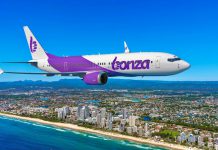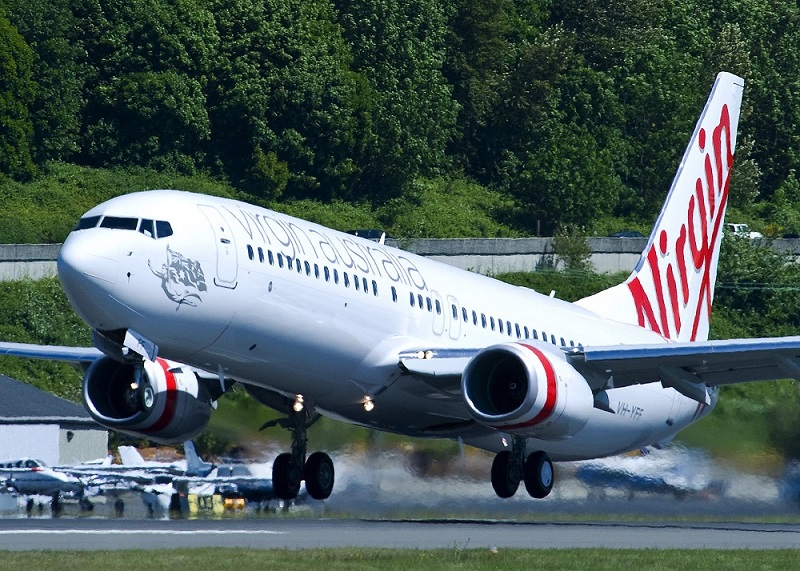The Virgin Australia Group will double overall capacity cuts in the second half of the 2020 financial year to 6 percent and reduce frequencies on international routes as it grapples with the fallout of the coronavirus.
The cuts will increase to 7.7 percent in the first half of fiscal 2021 as the group tries to match supply to demand and concentrates on profitable routes.
Virgin followed other airlines in withdrawing its earnings guidance as well as cuts to remuneration that included a temporary 15 percent reduction in chairman and independent board director fees as well as the removal of executive bonuses.
It is also talking to the Australian government about relief from charges such as fuel excise and air navigation fees and is targeting additional cost reductions.
The cuts include a significant decrease in marketing spend, freezing discretionary and non-critical capital spending, pausing external consultancies as well as a reduction in crew hotel accommodation charges.
Chief executive Paul Scurrah said the Virgin’s predominantly domestic customer and revenue base had helped insulate it against some of the international impacts faced by it peers.
Scurrah said domestic operations accounted for 88 percent of passengers and 78 percent of revenue and while the company was not immune to the crisis, it was well-equipped to respond to the current environment.
“The group currently has a cash position in excess of $A1 billion,” he said. “We have no significant debt maturity until October 2021, and no significant aircraft deliveries until July 2021.
“As the situation has unfolded we’ve moved very quickly on a number of measures to help protect the group’s financial position.”
READ: Trump’s COVID-19 travel ban could see more airlines fail.
Part of that response will be to boost domestic capacity cuts in the second half from a previously announced 3 percent to 5 percent, driven by a 7 percent fall in the fourth quarter.
Services to be reduced will mainly be on markets that have multiple daily frequencies and the domestic cuts will increase to 6.2 percent in the first half of the 2021 financial year.
Cuts to international capacity will rise from 4.8 percent to 8 percent in the second half of 2020 and increase to 10.3 percent in the first half of 2021.
The airline will proceed with its new Brisbane-Haneda service but the frequency will be reduced from daily to three times a week from March 29 to May 3.
Its Sydney-Los Angeles service will also be reduced to five times a week from early May to early June.
Virgin had planned to reduce capacity across the Tasman by 2. 6 percent but will now cut it by 6 percent for the second half, including a strategic reduction on its Auckland-Melbourne route from May and a temporary cut to Auckland-Sydney services.
It said it would exit Auckland-Tonga from May 1 and Auckland-Rarotonga from July 21 as part of its ongoing network strategic review.
“The challenges presented coronavirus are unprecedented and as revenue declines, we need to pull the cost levers that are available to us,” Scurrah said.
The Virgin chief said the airline’s leadership group continued to meet daily to assess its response with a focus on measures aimed at minimizing the impact on the business and precautions to protect staff and passengers.
Asked about the impact of moves by big businesses to cut flying, he noted Virgin had a heavier weighting towards the SME market and this seemed to be more resilient than the top corporate market.
But it was still seeing some softness in that space and the latest measures were in anticipation of that continuing.
He said the reduction in services would mean reduced flying for crews and it was committed to working with staff and providing a range of options.
Virgin had already decided to cuts its workforce by 750 people and Scurrah said there were no specific numbers on further job reductions and it was working with staff on areas such as leave without pay and filling vacancies internally.
“Later on we may get into job reductions and redundancies but there’s plenty to go through before we get to that point,” he said.
The group has accelerated the departure of eight Tigerair Australia Airbus A320s but Scurrah said there were no plans to take the bigger widebody A330s out of the operation as part of the cuts.
He noted the airline was assessing its future widebody strategy but said widebodies “will be part of our future”.
The news wasn’t all gloomy and Scurrah pointed to some encouraging signs in the domestic market.
“Pleasingly, our bookings in Western Australia and local leisure destinations such as the Gold Coast, Sunshine Coast and Hamilton island continue to be ahead of where they were at the same time last yearr,” he said.
“This demonstrates Australians are continuing to travel within our own backyard and support local tourism.”
He added that Virgin had launched a domestic sale with the majority of airfares under $A100 to help stimulate travel.
“Tourism is an important stimulant to our economy and we will continue to promote travel during this time as well as ensure our hygeine practices are at the highest stadnard to put our crew and passengers at ease when flying,” he said.
The Virgin announcement came as health authorities are attempting to contact passengers who come in contact with a flight attendant who tested positive for coronavirus.
Scurrah said he had spoken to the flight attendant, who was in good spirits, was feeling well and was in isolation.
























